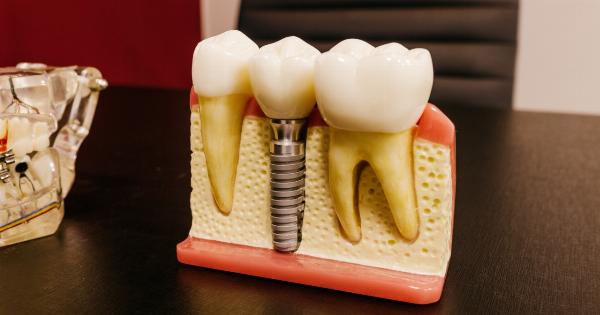Oral ulcers, also known as mouth sores, can be an uncomfortable and painful condition. They are small, round or oval-shaped lesions that develop on the inside of the cheeks, lips, or underneath the tongue.
These sores are often white or yellowish and surrounded by a red border.
Causes of Oral Ulcers
Oral ulcers can have various causes, including:.
- Minor injuries or trauma to the mouth
- Oral infections, such as herpes simplex virus
- Autoimmune diseases, like lupus or Behçet’s disease
- Nutritional deficiencies, particularly of vitamin B12, iron, or folate
- Allergic reactions to certain foods or oral care products
- Stress or hormonal changes
Managing Oral Ulcers: Tips and Remedies
If you’re suffering from painful oral ulcers, follow these tips and remedies to manage the condition:.
1. Maintain Oral Hygiene
Good oral hygiene is essential to prevent infection and promote healing. Brush your teeth gently with a soft-bristled toothbrush and use a mild, non-alcoholic mouthwash to rinse your mouth regularly.
2. Over-the-Counter Pain Relief
Non-prescription pain relievers such as acetaminophen or ibuprofen can help alleviate the discomfort associated with oral ulcers. Follow the instructions on the package and consult your healthcare provider if needed.
3. Topical Over-the-Counter Treatments
Topical treatments like benzocaine gels or creams can provide temporary relief by numbing the affected area. Apply these products carefully following the instructions provided.
4. Saltwater Rinse
A saltwater rinse is a simple and effective remedy for oral ulcer pain. Mix half a teaspoon of salt into a glass of warm water, swish the solution around your mouth for 30 seconds, and then spit it out.
Repeat several times a day to help reduce inflammation and promote healing.
5. Aloe Vera Gel
Aloe vera gel has soothing and anti-inflammatory properties. Apply a small amount of pure aloe vera gel directly onto the ulcer using a cotton swab. Allow it to sit for a few minutes and then rinse your mouth with water.
Repeat this process a few times daily until the ulcer improves.
6. Licorice Root Extract
Licorice root extract has been used for centuries to relieve oral discomfort. Look for a natural licorice root extract and apply it directly to the ulcer. Leave it on for a few minutes before rinsing your mouth. Repeat this process a few times daily.
7. Honey
Honey possesses natural antibacterial properties and can accelerate the healing process. Dab a small amount of honey onto the ulcer and leave it for as long as possible before rinsing your mouth. Repeat this process a few times throughout the day.
8. Avoid Irritants
Avoiding irritants such as spicy or acidic foods, tobacco, and alcohol can help prevent further irritation and promote faster healing.
9. Stay Hydrated
Drinking plenty of water throughout the day helps keep your mouth moist and prevents excessive dryness, which can aggravate oral ulcers.
10. Stress Management
Stress has been linked to the occurrence of oral ulcers. Engaging in stress-reducing activities like meditation, exercise, and getting enough sleep can help manage and prevent outbreaks.
When to Seek Medical Attention
Most oral ulcers heal on their own within 1-2 weeks. However, if you experience any of the following symptoms, it is important to seek medical attention:.
- Persistent ulcers that do not improve after two weeks
- Large, painful ulcers that make it difficult to eat or drink
- Frequent outbreaks or ulcers accompanied by other symptoms
- Signs of infection, such as fever, swollen lymph nodes, or pus
Conclusion
By implementing these management techniques and utilizing natural remedies, you can effectively alleviate the discomfort caused by painful oral ulcers. It is important to be patient, maintain good oral hygiene, and seek medical attention if necessary.
Remember, prevention is always better than cure, so take measures to reduce stress, follow a balanced diet, and avoid triggers that can lead to oral ulcer outbreaks.






















